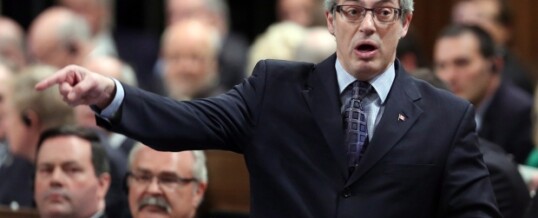
McLeod Group Blog, Sept. 18, 2015
Through its most excellent management of the economy, the Harper government finally discovered, after six years in the red, how to balance the budget.
The surplus in 2014-15, we are told, amounts to $1.9 billion. This is seriously good news for a Conservative election campaign that seems a bit like a dump truck rolling downhill without brakes.
So how on earth did they finally do it? They did it in three ways. The first was asset-stripping. Expensively acquired embassies and official housing around the world, worth hundreds of millions, along with shares in General Motors have been sold at fire-sale prices over the past three years to create one-off gains on the asset account.
The second was budget cuts. Most departments have had their budgets slashed and their staff decimated. Over the past three years, for example, nearly 26,000 civil service jobs were cut, and another 8,900 will be on the chopping block before 2017.
In a September 12 article entitled “Strong, proud and Free-riding”, The Economist said that while Canadians like to see themselves as global benefactors, “in fact they have been pinching pennies on aid and defence.” Not pennies, exactly – dollars, and billions of them. Canada’s spending on defence as a percentage of GNP is the lowest in the G7, and as a percentage of gross national income, our aid budget has been reduced by 28% since 2008. Britain’s, in contrast, has increased by more than 60%.
The third contribution to the surplus was ordering ministers to simply sit on the cheque book and, regardless of whatever budget had been agreed on, spend less. CSIS, the RCMP and Defence have lapsed (i.e., failed to spend) $11 billion since 2007. Nearly $100 million was lapsed by Employment and Social Development Canada in a single year, the biggest loser being the youth employment program. Aboriginal Affairs lapsed $1 billion over the past five years and Veterans Affairs lapsed $1.1 billion over seven.
In all, $8.7 billion was handed back to the treasury in 2014-15, so the wonder of it is that the surplus is only $1.9 billion. Where did the rest go? Advertising and infrastructure projects in Conservative ridings perhaps.
Treasury Board President Tony Clement called all of this lapsing “a sign of good management”, suggesting that the departments in question really didn’t need what they had been allocated. A lot of senior civil servants who waited in vain for their ministers to sign approval documents would disagree. When budgets are being slashed, knowing how much you actually have to spend is critical to good management. When you don’t know when, or even if, a minister will ever sign off on a program, all you get is confusion and bad management.
An estimated $125 million in foreign aid funds lapsed as well last year—money for poor people in poor countries. Anyone on the receiving end of the approval paralysis at DFATD knows the joke about the aid minister’s desk being the biggest one in Ottawa. The answer to every query about long-delayed decisions was, and remains, “It’s on the minister’s desk.”
Slashing and stalling were also rampant in the Department of Citizenship and Immigration, where Minister Chris Alexander, ever- and frequently over-eager to please his boss, stunted and delayed spending, returning $350 million to the treasury. It’s no surprise that his department can’t promise to process more than a few hundred Syrian refugees this year. The department has been gutted of both cash and capacity. To add insult to injury, after all the “cracking down” Alexander and his predecessor Jason Kenney have done, the government actually requires refugees to pay for their medical exams and their own travel costs to Canada, lending them the money and then charging them interest on the loans. Worst of all, the government has also been battling doctors and the courts for almost three years over its cuts to health care for thousands of refugee claimants.
Such are the nifty ways to build a surplus and demonstrate excellent financial management.
